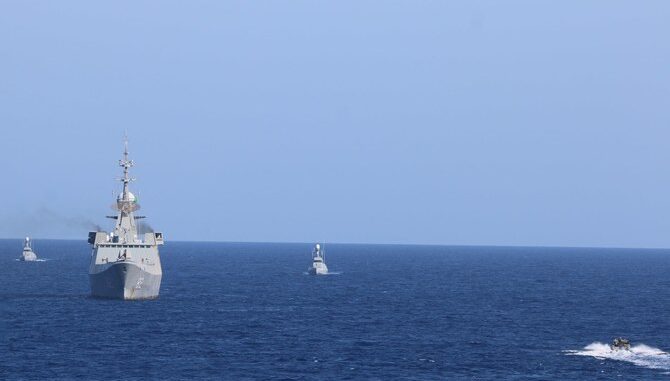
AL-MUKALLA: The US military said Yemen’s Houthi militia has fired a new wave of drones and missiles into international shipping lanes off Yemen, including two missiles aimed at a US warship in the Red Sea.
This comes as the Houthis claim to have made another reprisal hit on a US ship in the Red Sea.
The US Central Command said on Sunday that the Houthis launched three drones over the Red Sea on Saturday, one of which was destroyed by its forces, while the other two fell into the water, failing to strike any ship in the important commercial corridor.
The US military said in a statement on Sunday morning, Yemen time, that no injuries or damage was reported by the US coalition or commercial ships.
Also on Saturday, CENTCOM forces intercepted two anti-ship ballistic missiles in the southern Red Sea before they reached their target, the destroyer USS Gravely.
“The ASBM were fired in the direction of USS Gravely and were destroyed in self-defense, with no damage or injuries reported by US, coalition, or commercial ships,” the US military said in the same statement.
On Friday, the Houthis launched five drones and two ballistic missiles into the Red Sea and the Gulf of Aden, but did not hit any ships on the two commercial routes, CENTCOM said.
In Sanaa, the Houthis claimed on Saturday night to have carried out six strikes on commercial and navy ships, including one on the aircraft carrier USS Dwight D. Eisenhower, in the Red Sea and the Indian Ocean.
In a videotaped statement, Houthi military spokesman Yahya Sarea said that their troops launched several ballistic missiles and drones at the US aircraft carrier and a US destroyer in the Red Sea.
The other four attacks targeted three ships: Maina in the Red Sea, the Al-Oraiq in the Indian Ocean, and the Abliani in the Red Sea, alleging that they had breached a ban on visiting Israeli ports.
Ship-tracking app Marine Traffic identified the Maina as a bulk carrier flying the Malta flag that left Russia’s Baltic Sea port of Ust-Luga early last month for Krishnapatnam Port in India.
The Marshall Island-flagged Al-Oraiq is an LNG tanker sailing from Ras Laffan in Qatar to Italy, while the Malta-flagged Abliani is a crude oil tanker sailing to the Suez Canal in Egypt, according to the app.
Since November, the Houthis have sunk one commercial ship, captured another, and claimed to have shot hundreds of ballistic missiles and drones at more than 100 ships in the Red Sea, Bab Al-Mandab Strait, Gulf of Aden, Indian Ocean, and most recently the Mediterranean.
The Houthis claim that their actions are aimed solely at ships with links to Israel in an atempt to put pressure on Israel to end its war in Gaza, a claim challenged by the Houthis’ opponents in Yemen, who accuse the militia of exploiting the nationwide outrage of civilian deaths in Gaza to shore up their public support at home.
The US reacted to the Houthi assaults by labeling them as a terrorist organization, organizing a marine alliance to protect the seas, and launching airstrikes on Houthi sites in Yemen.
Despite US assertions that its strikes have weakened the Houthis, analysts say the increasing number of Houthi attacks on ships demonstrate that the strikes are ineffectual and that the Houthis continue to feel that their attacks have increased their popularity.
“It (the surge in Houthi attacks] suggests that US-UK airstrikes against Houthi targets are not working, at least not yet and not as effectively as intended,” Elisabeth Kendall, a Middle East expert and head of Girton College at the University of Cambridge, told Arab News. “It suggests that the Houthis believe their attacks continue to work for them in terms of gaining broad popularity, international notoriety and greater leverage in ongoing efforts to end the Yemen war. They see no reason to stop,” she added.
Kendall said that maintaining strikes on ships, even with less accurate weaponry, is a win for the Houthis.
“The Houthis are resilient and the asymmetric nature of the Red Sea conflict plays to their advantage. The sophistication of their weaponry may diminish, but all they need to do is to keep going.”



